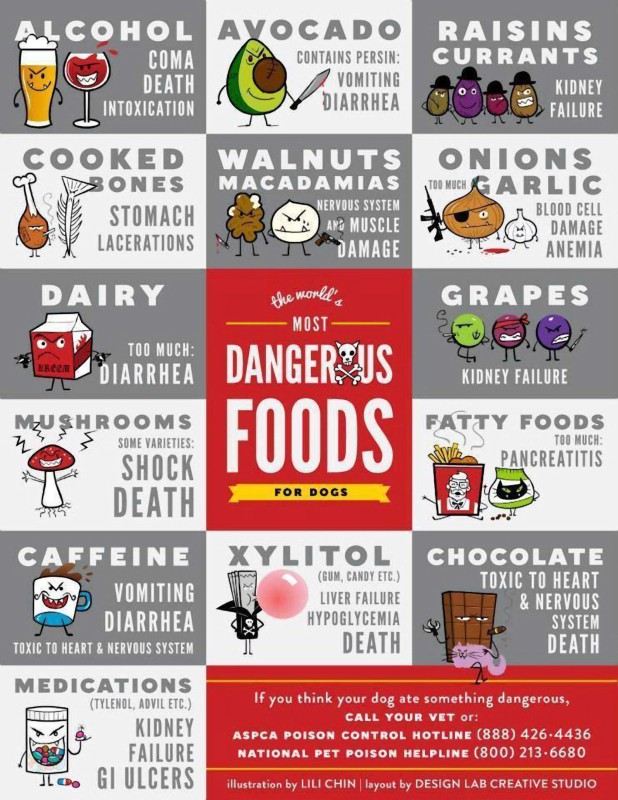
By Dr. Dan Taylor
Emergency Veterinarian
As we sit down to relax with our favorite snack, there are times that our four-legged friends want in on the action. In a scenario that is all too common for dog owners, big brown eyes follow each treat intently, hoping for just a sample. Their expressions prompt us to sometimes share just a small piece of our food. Most times we don’t give this action a second thought. However, this seemingly innocent gesture of sharing can have unintended, and sometimes fatal, consequences. Knowing the difference between a healthy treat and a potentially toxic food can prevent late night and weekend trips to the emergency clinic.
While treats like chocolate-causing toxicity in dogs is widely known by pet owners, other foods such as onions, grapes and macadamia nuts are not as well understood. Other human products such as sugar-free gum or candy, brewer’s hops and unbaked bread dough can also cause serious problems.
Onions and garlic can have a harmful effect on dogs’ red blood cells. This damage leads to the destruction of red blood cells and can cause severe anemia, or lack of red blood cells. This can lead to the need for blood transfusions and long hospital stays. As onions and garlic are in many foods, including baby foods, it is important to read labels to know if these ingredients are present.
Two other natural foods that can be toxic to dogs are grapes and raisins. When ingested, these fruits can cause kidney failure. We are not sure why these foods are toxic, what animals are susceptible or what the toxic amount is, therefore, it is important to avoid giving our dogs grapes or raisins altogether. Raisins tend to be more toxic than grapes, but both can still land a dog in the animal ER for a few days.
A lesser-known possible canine toxin is macadamia nuts. These nuts cause muscle weakness, muscle tremors, vomiting and high body temperatures. While these rarely prove fatal in dogs, it only takes a very small amount to cause signs and make for a scary two to three days of hospitalization.
A food additive that has become more popular over the last decade is xylitol, a sweetener that is found in sugar free gum, candy and cough drops. Xylitol can drop blood sugars to dangerously low levels and can also cause liver failure. Dogs are especially sensitive to this compound and even a small amount can cause problems. Prompt treatment is required when xylitol is ingested as it is absorbed into the bloodstream very quickly.
The recent boom of home brewing beer can also have risks to dogs. Dogs can be attracted to the fragrant hops and eat them. Hops can be toxic to dogs by causing a condition called malignant hyperthermia, which is a dangerous increase in body temperature. Too high of a body temperature can cause muscle and brain damage. Unbaked bread dough will also cause problems if ingested. Not only does the dough rise in dogs’ stomachs, but also the yeast will produce ethanol (alcohol) that can actually intoxicate dogs.
To avoid any potential problems, dogs should only be fed dog food, treats labeled for dogs, or foods that have been recommended by a veterinarian. If ingestion of a possibly toxic food occurs, have your pet evaluated by a veterinarian in a timely manner. In most cases, recent ingestions of substances like chocolate, vomiting can be induced, effectively removing the toxin from the body. Additionally, a substance called activated charcoal (not the kind that is used in grilling) is given to prevent further absorption of any toxin remaining in the stomach or intestines. If ingestion of a particular food takes place over four hours before coming to the hospital, these treatments will not be as effective and other treatments such as hospitalization and IV fluid therapy may be needed. If there is ever a question of whether or not your dog needs emergency treatment for eating something she shouldn’t, seek veterinary advice sooner rather than later.
Dr. Dan Taylor is an Emergency Veterinarian at Aspen Meadow Veterinary Specialists. AMVS is a 24-hour veterinary facility providing specialty internal medicine, orthopedic surgery, oncology, neurology, emergency, critical care, and pain management. They are located in Longmont at 104 S. Main St. For more information, go to www.AspenMeadowVet.com.

 Print This Post
Print This Post







